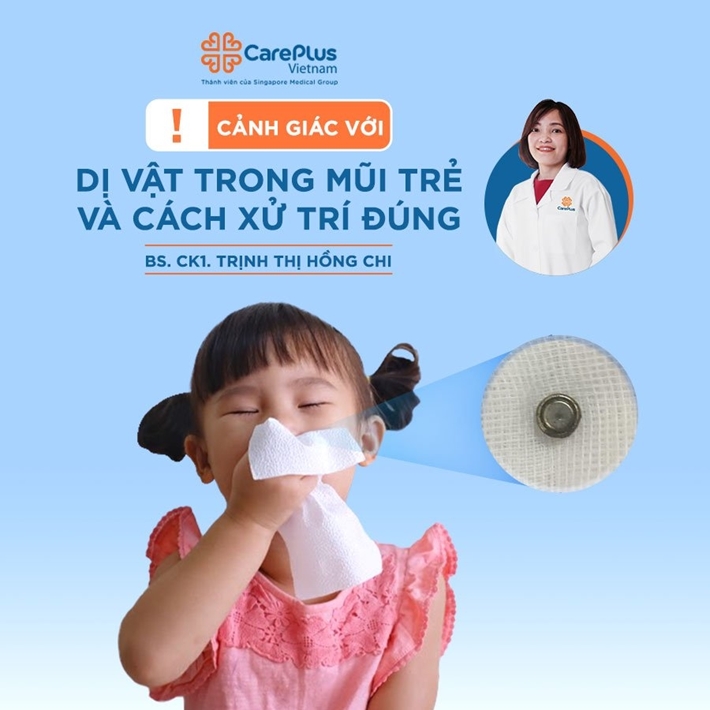Be aware of foreign bodies in children's noses & How to handle them properly?
In 2 consecutive weeks, CarePlus has 2 cases of dangerous nasal foreign bodies in children " - Specialist Doctor 1 Trinh Thi Hong Chi (Otolaryngology Specialist at CarePlus Clinic). While the children are very active, most of them are elderly grandparents who cannot continuously observe the child's activities, so the risk of accidents with foreign bodies is quite high. Small objects children can put in their noses, such as button batteries, ballpoint pen caps, nuts, etc., are all potential hazards.

7/6/2021 4:44:39 PM
1. How dangerous is a foreign body in the nose?
Most cases of foreign bodies in the nose are not too serious and usually occur in children who are learning to walk or between the ages of 1 and 7 years old. Young children begin to hold, grasp and pick up objects from 9 months, so foreign things in the nose are less common in children younger than this age.
A foreign object stuck in the nose may not cause unusual symptoms at first but still needs to be detected and removed as soon as possible. Otherwise, the foreign body can cause local infection and serious complications.
Moreover, the foreign body in the nose can sometimes go into the mouth, and the child will swallow it in the stomach or, more dangerously, the foreign body can fall into the lungs and cause airway obstruction.
2. What are common foreign bodies in the nose?
- Inorganic type: plastic or metal (less stimulation, long to detect): flat beads, plastic pieces, small toys
- Organic type: (usually stimulating, early detection): food, sponge, wood chips, tissue, nuts, clay, pebbles, pills
- Especially button batteries: watch batteries, hearing aid batteries
In particular, button batteries (usually found in watches or small electronic toys) are objects that need to be kept out of reach of children. These batteries can cause serious damage to the nose when left in the nose for at least 4 hours.
3. Signs and symptoms of foreign body in the nose:
Children are often in danger when they are not self-aware of the seriousness of foreign objects in their beaks. Some signs that may make you suspect a foreign body in your child's nose include:
- History: self-reported, relatives discovered
- One-sided runny nose: A foreign object stuck in the nasal passage will stimulate the nasal mucosa to secrete mucus, causing a runny nose. The first stage of the nose is clear, then cloudy, with a bad smell. Sometimes, the foreign body also scratches the lining of the nose, leading to nosebleeds.
- One-sided stuffy and sore nose. Fever.
- Itchy nose, sneezing.
- Snoring, breathing with a hissing sound in the nose.
4. What is the cause of the foreign body in the nose?
Most foreign objects in the nose of children appear for many reasons, most of which are intentional actions due to the child's curiosity or because you inserted them in the nose at preschool age. Parents mustn't scold when they detect that children act with foreign objects in their mouth, nose or ears because they may panic without notifying the problem. And it slows the detection of foreign bodies.
5. Diagnosis and treatment:
- Take your child to the doctor if you suspect he has a foreign object in their nose
- Do not try to remove the foreign body in the baby's nose with a cotton swab or other non-specialized tools because it can drop the foreign body from the nose down the throat and into the airways, which is very dangerous.
- Do not ask the baby to try to inhale forcefully when there is a foreign object in the nose.
- The doctor will remove the foreign body from the nose with specialized tools through examination by clar light or nasal endoscopy with the help of assistants. If there is bleeding or ulceration of the septum, after removing the foreign body (due to corrosive foreign bodies: button batteries), will be treated with antibiotics, anti-inflammatory, hemostasis
6. Complications of long-forgotten nasal foreign bodies:
- Sinusitis.
- Acute otitis media.
Complications due to improper handling:
- Change to foreign airway body.
- Transformed into a foreign body.
7. Measures to help prevent foreign bodies in the nose
- Always observe children while playing to promptly prevent actions from putting objects in the mouth, nose, and ears. Avoid buying items or toys with too small details for children. At the same time, you should not scold your child if you catch them putting a foreign object on their face.
- With older children, you can gently explain the function of the airways and the possible dangers of putting foreign objects in the nose.
- In addition, children should not eat while playing or talking while eating to avoid choking, leading to food particles moving into the respiratory tract by mistake. Keep small, dangerous objects out of the reach of children.
Post shared by BS. Trinh Thi Hong Chi, Specialty 1
Specialty Ear, Nose and Throat CarePlus International Clinic